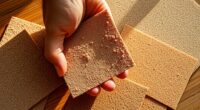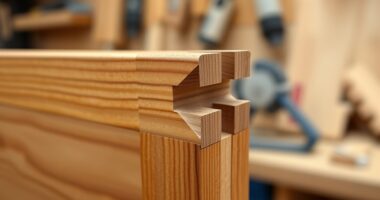If you’re looking for the best mortise and tenon joints that balance strength with craftsmanship, I recommend exploring various jigs, bits, and tools designed for precise, durable joinery. From dovetail jigs to router bits and mortising attachments, these options make creating tight, long-lasting joints easier for both hobbyists and professionals. Choosing the right equipment impacts the quality of your work. Keep going to discover detailed insights on selecting the perfect tools for your projects.
Key Takeaways
- Properly fitted mortise and tenon joints ensure maximum strength and durability in woodworking projects.
- Using high-quality, durable tools like alloy steel bits and precise jigs enhances joint craftsmanship.
- Accurate measurements and tight fits are essential for creating strong, long-lasting mortise and tenon connections.
- Combining traditional joinery techniques with modern jigs improves both strength and aesthetic craftsmanship.
- Selecting the right joint type (blind, through, haunched) based on application increases structural integrity and visual appeal.
Dovetail Jigs for Woodworking
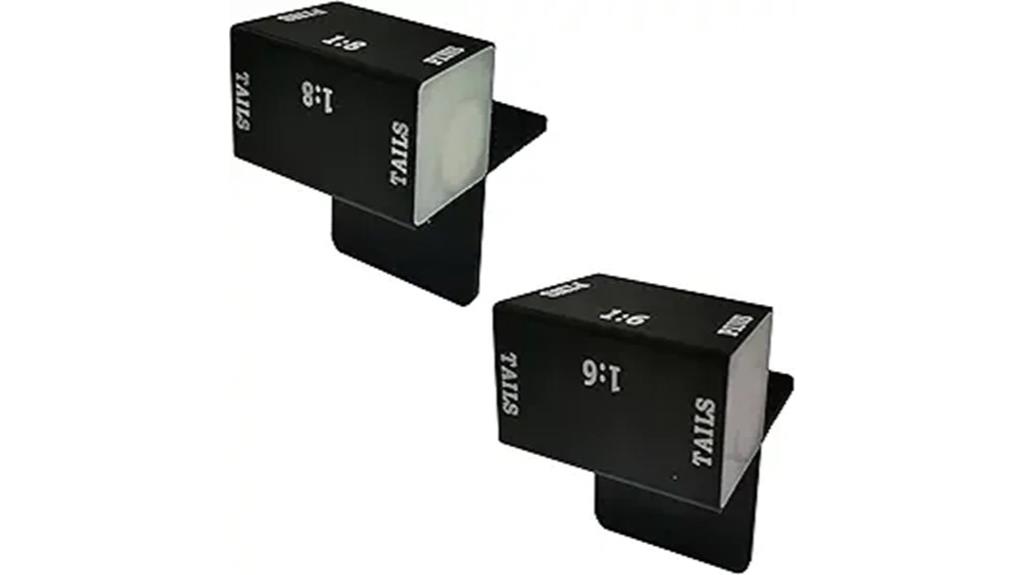
If you’re a hobbyist or DIY woodworker looking for an affordable and easy-to-use tool, dovetail jigs designed for woodworking are an excellent choice. They let you mark precise joints like dovetails, mortises, and tenons with ease. The magnetic base and adjustable fence guarantee consistent, professional-quality results. You can use them for standard dovetails, box joints, and finger joints, all while maintaining control with hand saws. Lightweight and simple to operate, these jigs are perfect for beginners and experienced woodworkers alike. They help produce accurate, sturdy joints without the need for expensive equipment, making your projects both easier and more satisfying.
Best For: hobbyists and DIY woodworkers seeking an affordable, easy-to-use tool for precise joints like dovetails, mortises, and tenons.
Pros:
- Simple to operate with magnetic base and adjustable fence for consistent results
- Lightweight and portable, making it suitable for beginners and experienced users alike
- Produces accurate, professional-quality joints at an affordable price point
Cons:
- Weak magnets may fail to lock components securely, requiring clamps for stability
- Some users report misaligned frames and limitations on deep saw cuts due to size constraints
- The aluminum material can gouge if mishandled, and quality may vary between units
Kreg MortiseMate Loose Tenon Jig for Woodworking
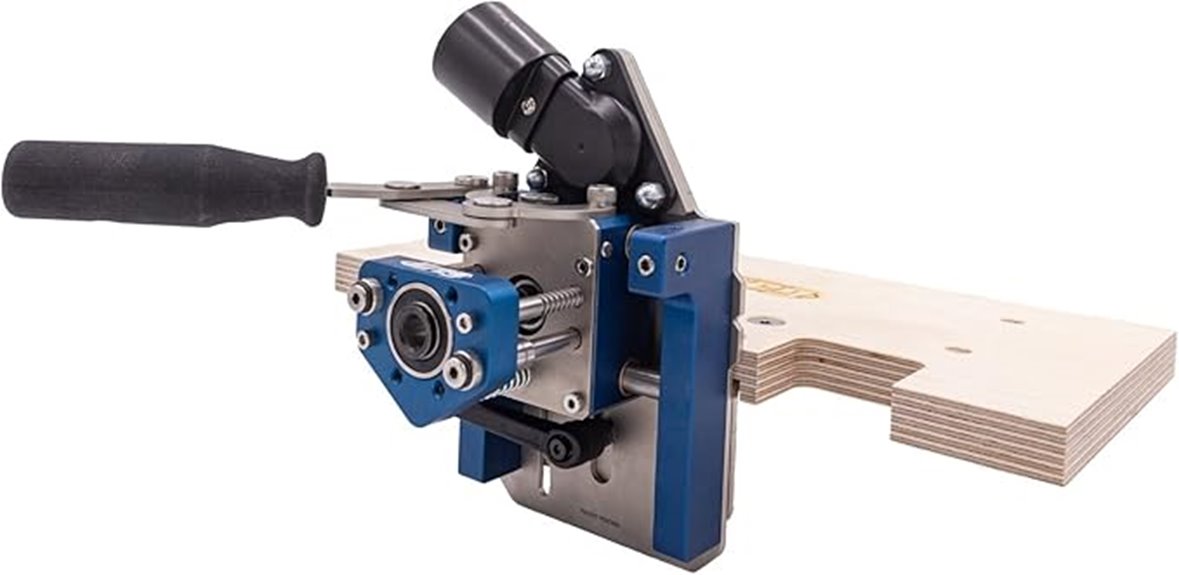
The Kreg MortiseMate Loose Tenon Jig stands out as a versatile and affordable option for woodworkers seeking precise mortise and tenon joints without investing in high-end machinery. It fits workpieces 1/2 to 1 1/2 inches thick and features an auto-indexing step-down mechanism for accurate depth control. The integrated mini work surface and trigger clamps make setup quick and secure, while micro adjustment screws and laser-etched markings allow customization. Constructed with sturdy materials, it offers reliable performance, though some parts can flex. With practice, it produces consistent mortises, making it ideal for hobbyist projects and light woodworking tasks. Overall, it’s a valuable tool that balances cost and functionality.
Best For: hobbyist woodworkers and DIY enthusiasts seeking an affordable, precise jig for light mortise and tenon joinery projects.
Pros:
- Accurate and repeatable mortise cuts with micro adjustments and laser markings
- Easy setup with integrated work surface and trigger clamps for quick securing
- Cost-effective alternative to high-end joinery systems suitable for occasional use
Cons:
- Some metal parts may flex or feel flimsy, affecting cut quality
- Requires practice to master proper operation and achieve consistent results
- Not designed for heavy-duty or high-volume woodworking applications
General Tools Mortise and Tenon Jig with Drill Template Set
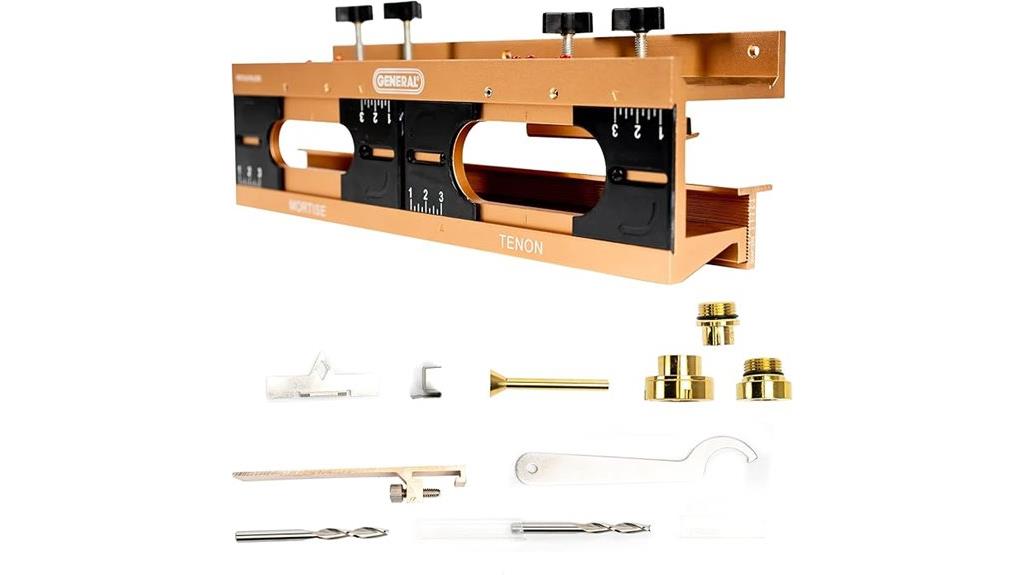
For woodworking enthusiasts seeking an affordable yet reliable solution, the General Tools Mortise and Tenon Jig with Drill Template Set offers impressive versatility. Made from durable aircraft-grade aluminum, it’s ready to use right out of the box, making precise 1/4-inch joints, with extra bushings for larger sizes. The jig features integrated clamps and swing arms for alignment, compatible with plunge routers for cuts from 1/4 to 1-1/4 inches wide. It mounts easily on workbenches or clamps, providing stability. While setup is straightforward, some users find the clamps and alignment features less secure, requiring adjustments. Overall, it’s a solid choice for hobbyists prioritizing cost and functionality.
Best For: DIY woodworking enthusiasts and hobbyists seeking an affordable, versatile mortise and tenon jig for small to medium projects.
Pros:
- Made from durable aircraft-grade aluminum for stability and long-term use
- Ready to use straight out of the box with included accessories for different joint sizes
- Compatible with plunge routers, allowing precise and consistent cuts
Cons:
- Clamping mechanisms may be insufficient, requiring additional adjustments for secure hold
- Lacks adjustable stops or precise positioning features, which can affect repeatability and alignment
- Small knobs and tight clamps can be difficult to tighten, especially for users with limited hand strength
OSKOOL Mortise and Tenon Jig for Cabinet, Chair, and Table Construction
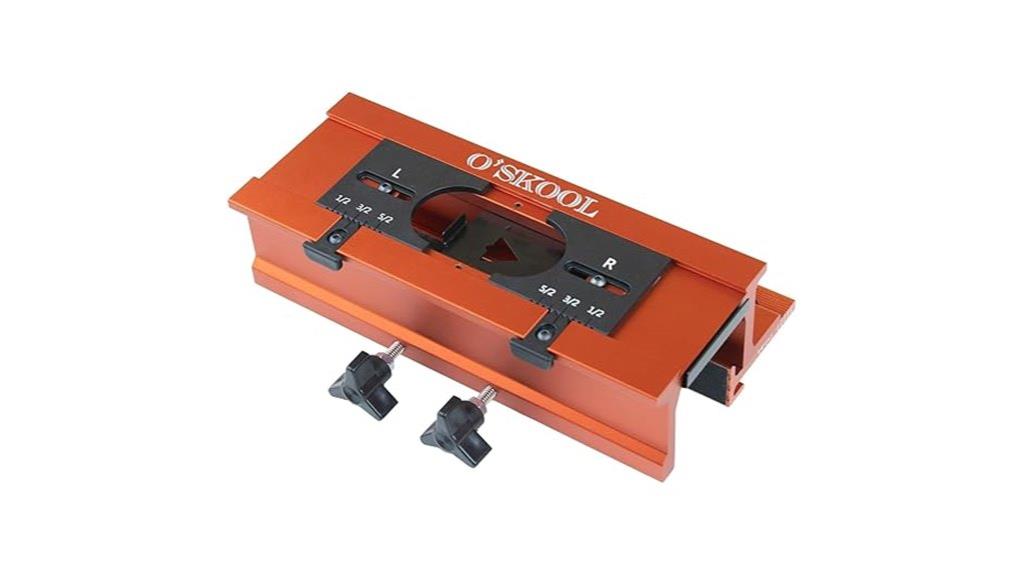
Crafted from durable anodized aluminum, the OSKOOL Mortise and Tenon Jig delivers precise, repeatable joints ideal for cabinetmakers and furniture enthusiasts alike. It’s versatile enough to handle cabinetry, chairs, and tables, with the ability to cut fully aligned mortises and tenons from 3/4 to 3-1/8 inches long and 1/4 to 1/2 inches wide. Its solid construction guarantees stability during use, and the easy setup allows for consistent results across multiple pieces. Compatible with common routers, it’s perfect for creating tight, square joints with minimal fuss. While it requires additional mortise bits for wider cuts, its high-quality build and accuracy make it a valuable tool for any woodworking shop.
Best For: DIY furniture makers, cabinetmakers, and woodworkers seeking precise, repeatable mortise and tenon joints for cabinetry, chairs, and tables.
Pros:
- Solid anodized aluminum construction offers durability and stability during use
- Guarantees consistent, accurate mortise and tenon dimensions across multiple pieces
- Compatible with common handheld and mid-size routers for versatile application
Cons:
- Requires additional mortise bits for wider cuts beyond 1/4 inch
- Some users experience loose fitting of template guides with certain routers, needing extra adjustments
- Dust collection can be messy, and clamping workpieces securely may require additional fixtures
Mortise and Tenon Jig Tools for Woodworking Routers
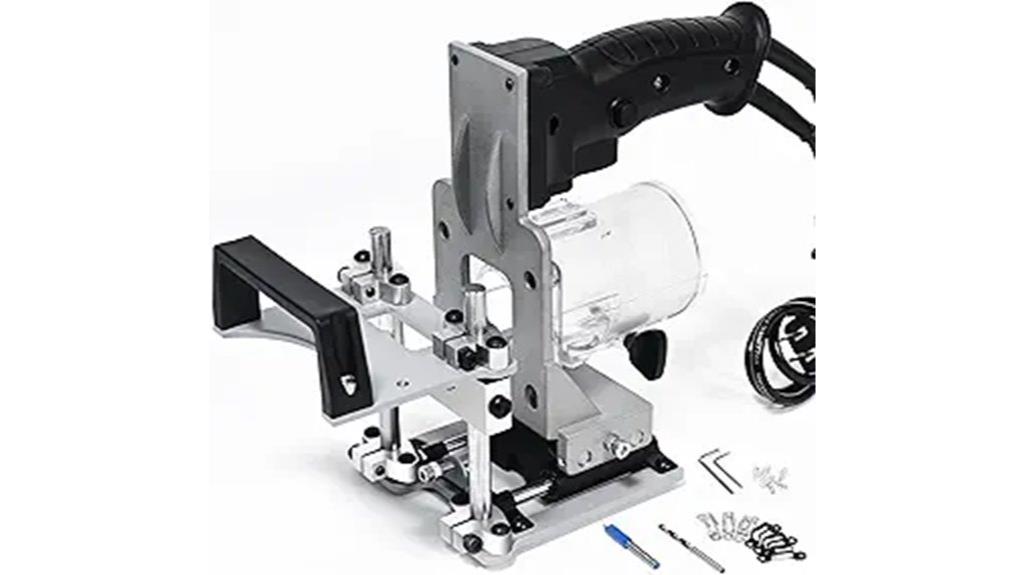
If you’re looking for an affordable and versatile mortise and tenon jig to use with your woodworking router, these tools offer a practical solution. They feature a 2-in-1 system suitable for mortise and tenon work, compatible with routers having a 64-65mm diameter. The jig’s 3-axis guide rail allows adjustable length and width, ensuring precise cuts. Weighing only around 4.4 pounds, it’s easy to handle. The package includes an alloy cutter and small tools for plug-and-play operation—though routers aren’t included. Humanized design elements like non-slip handles, a transparent dust shield, and safety features make it user-friendly, though some users modify it for added stability.
Best For: DIY woodworking enthusiasts seeking an affordable, versatile mortise and tenon jig compatible with standard routers for precision joinery.
Pros:
- Cost-effective alternative to high-end tools like Festool Domino.
- User-friendly design with non-slip handles, transparent dust shield, and safety features.
- Adjustable 3-axis guide rail allows for precise and customizable cuts.
Cons:
- Compatibility issues with certain routers, such as Bosch or Makita, due to wiring or size differences.
- Limited accessories included; some parts like trimmer are not provided.
- Short screws and non-standard power cords may affect stability and safety, requiring modifications.
Dovetail Jigs for Woodworking
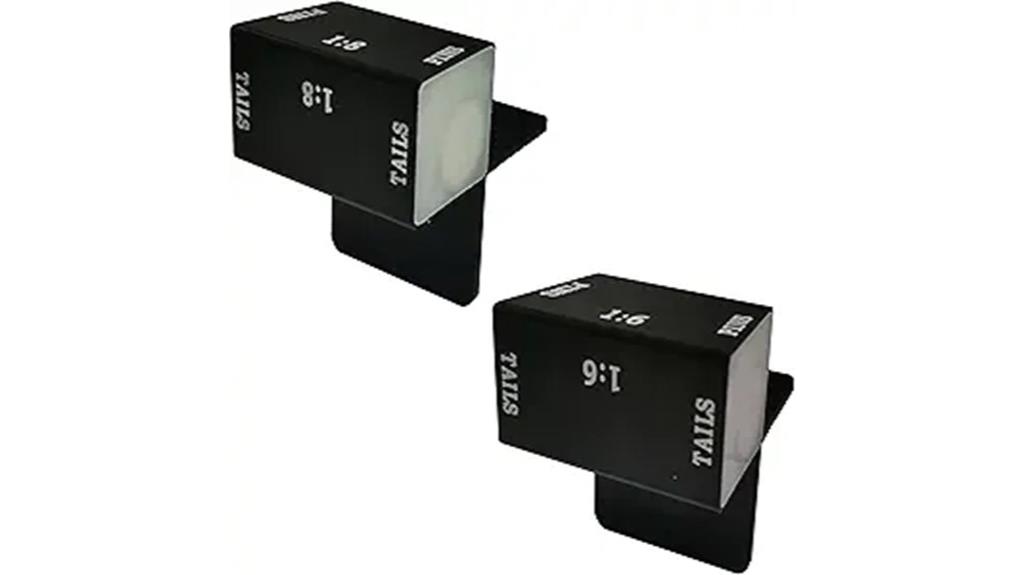
Dovetail jigs for woodworking stand out as an essential tool for hobbyists and professionals alike who want to achieve precise, consistent joints with minimal effort. These jigs help mark and cut dovetails, box joints, and mortise-tenon joints accurately, thanks to features like adjustable fences and magnetic bases. They’re simple to use—just secure the jig, set the spacing, and mark your cuts—making them ideal for both beginners and experienced woodworkers. Lightweight and easy to handle, they allow full control when using hand saws. While some users note magnet strength issues, overall, they offer great value for creating quality, reliable joints.
Best For: DIY enthusiasts and hobbyist woodworkers seeking an affordable, easy-to-use jig for precise dovetail and joint marking.
Pros:
- Simple operation with magnetic base and adjustable fence for consistent results
- Lightweight and easy to handle, suitable for beginners and seasoned woodworkers
- Produces accurate, professional-quality joints for various woodworking projects
Cons:
- Magnet strength may be insufficient, requiring additional clamps for stability
- Some users report misaligned parts and size limitations for deep cuts
- Durability concerns due to potential gouging of aluminum if mishandled
YUEWO Mortising Attachment for Drill Press
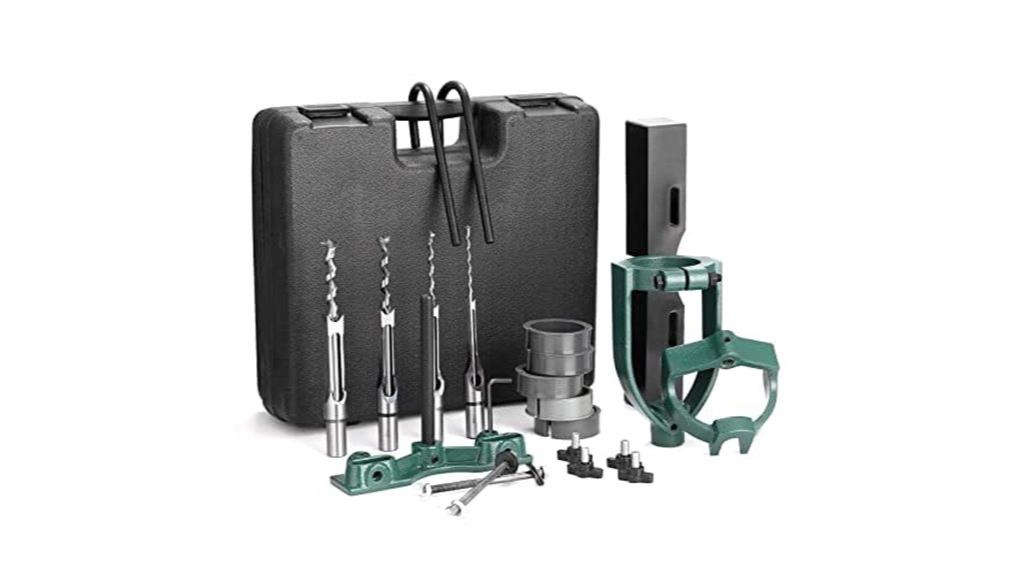
The YUEWO Mortising Attachment for Drill Press is an excellent choice for woodworking enthusiasts seeking precise mortise and tenon joints, especially when transforming a standard drill press into a dedicated mortising machine. It fits bench drill quill diameters from 2.09 to 2.95 inches, though some users may need shims or custom adjustments for compatibility. Made from durable cast iron and steel, it includes multiple chisels, bushings, and essential accessories for accurate square holes. Easy to install and operate, it enables fast, professional-quality mortises. However, fitting issues and limited instructions can pose challenges, so verifying your drill press compatibility beforehand is recommended.
Best For: woodworking enthusiasts and professionals looking to create precise mortise and tenon joints using a drill press conversion tool.
Pros:
- Made from durable cast iron and steel for longevity and stability
- Includes multiple chisels and accessories for versatile woodworking projects
- Easy to install and operate, enabling professional-quality mortises
Cons:
- Some users may experience fitting issues requiring shims or custom adjustments
- Limited instructions and potential language barriers can complicate setup
- Plastic drill head bushings may affect long-term durability
Trend Mortise and Tenon Jig for Furniture Joints
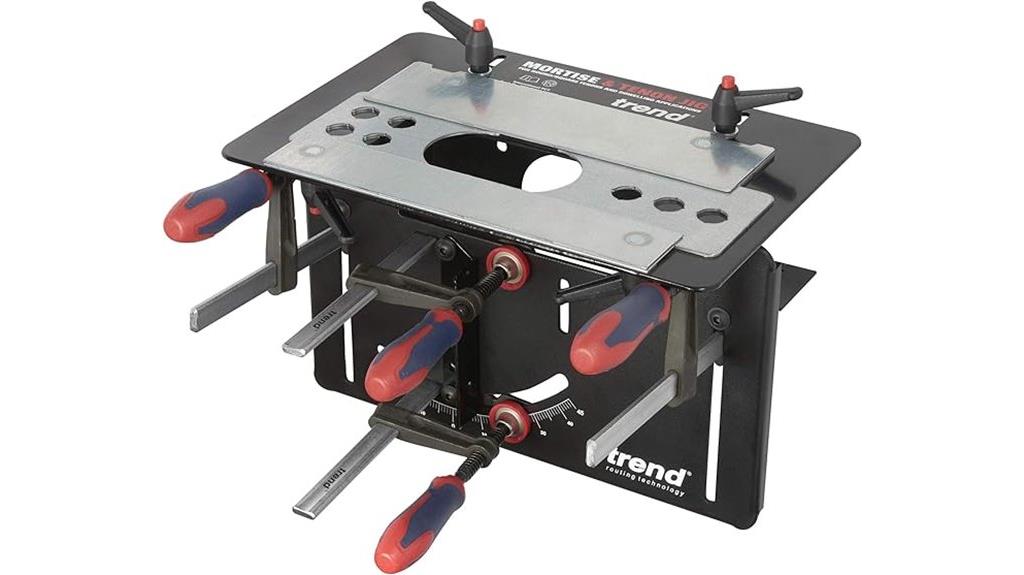
Looking for a versatile and precise jig to craft furniture joints with ease? The Trend Mortise and Tenon Jig is a great choice. Made of steel plates, it supports five common mortise and tenon sizes and handles material up to 1 7/8″ thick. It’s fully adjustable for angled cuts from -10° to 45°, perfect for complex joints. The setup bar and clamps make setup quick, though it’s best suited for experienced woodworkers due to some reported issues like guide bushings play and setup accuracy. Compact and robust, it’s ideal for creating strong, clean joints in cabinets, chairs, and tables.
Best For: experienced woodworkers seeking a versatile, adjustable jig to create precise mortise, tenon, and dowel joints for furniture projects such as cabinets, chairs, and tables.
Pros:
- Supports multiple mortise and tenon sizes and material thicknesses up to 1 7/8″ for versatile applications
- Fully adjustable for angled cuts from -10° to 45°, accommodating complex joint designs
- Constructed from durable steel plates and includes features like setup bar and clamps for efficient setup
Cons:
- Some users report issues with guide bushing play and imprecise setup, affecting joint accuracy
- Not fully plug-and-play; requires experience and adjustments for optimal results
- Limited compatibility with router types and potential difficulties with larger or 4×4 lumber without modifications
Trend 100pcs Beechwood Loose Tenons (6 x 40mm)
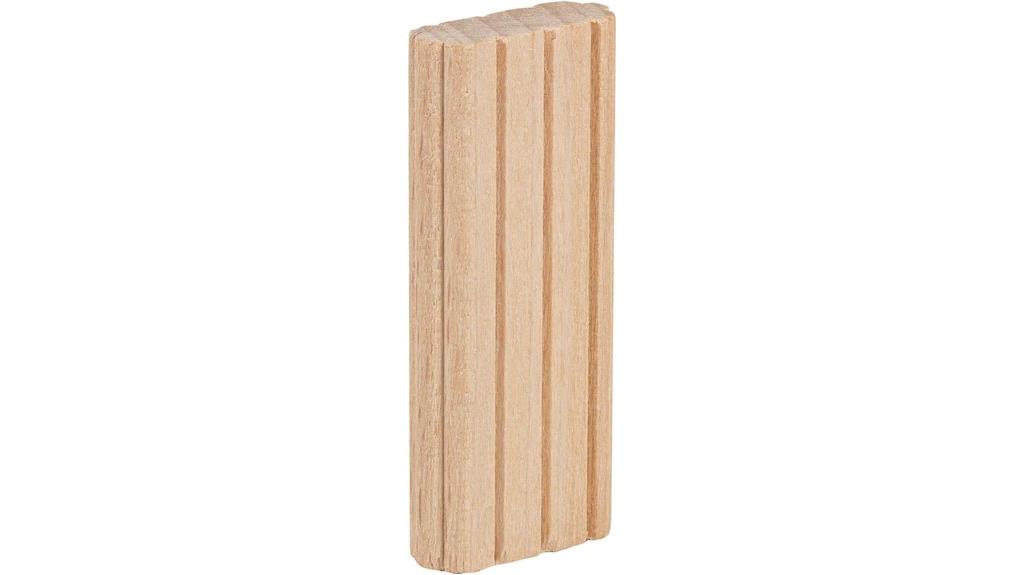
If you’re aiming for strong, precise joints in furniture making or carpentry projects, Trend’s 100pcs Beechwood Loose Tenons are an excellent choice. Made from certified beechwood, these tenons provide reliable, durable connections suitable for professional and DIY work. Their full-length glue grooves improve adhesion, ensuring secure joints. Designed for use with routers, mortice jigs, and Festool Domino systems, they offer versatility and efficiency. With 100 pieces in a convenient size, they help reduce waste and cost. While slightly looser than standard 1/4 inch mortises, they deliver consistent results, making them a valuable addition to any woodworking toolkit.
Best For: woodworking professionals and DIY enthusiasts seeking reliable, precise, and cost-effective joinery solutions for furniture and carpentry projects.
Pros:
- Made from certified beechwood for strong, sustainable, and stable joints
- Full-length glue grooves enhance adhesion and joint security
- Compatible with routers, mortice jigs, and Festool Domino systems for versatile use
Cons:
- Slightly looser fit than standard 1/4 inch mortises, which may affect some applications
- Limited to specific tools and systems, potentially reducing flexibility for some users
- Customer ratings average only 3.7 out of 5 stars, indicating mixed reviews on performance
Taytools Wheel Marking Gauge Mortise and Tenon Attachment Set
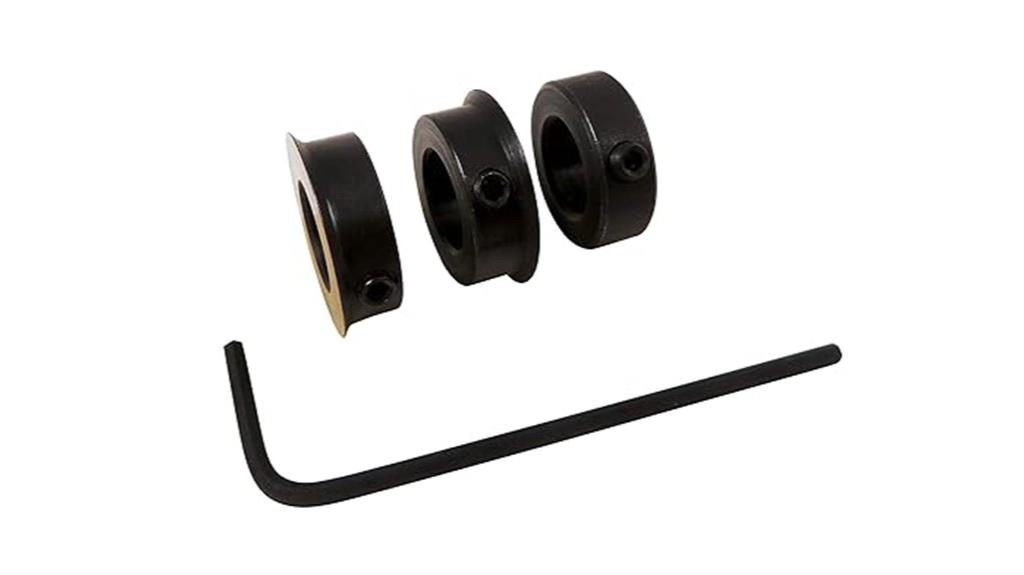
For woodworkers aiming for precise and efficient mortise and tenon layouts, the Taytools Wheel Marking Gauge Mortise and Tenon Attachment Set stands out as an essential tool. It fits wheel marking gauges with 8mm or 0.310-inch shafts and includes two hardened steel cutters, a spacer washer, and a hex wrench. The set allows marking both sides of mortises and tenons in a single pass, with adjustable spacing down to 3/8 inch. The round cutters produce clean, accurate lines, and the spacer ensures consistent depth. Made from durable steel, it’s easy to adjust and sharpen, making it a reliable choice for accurate, quick layout work.
Best For: woodworkers and furniture makers seeking precise, efficient, and clean layout marking for mortises and tenons.
Pros:
- Easily adjustable spacing down to 3/8 inch for versatile layout options
- Produces clean, distinct lines that are superior to traditional marking gauges
- Made from durable hardened steel, ensuring longevity and ease of sharpening
Cons:
- Compatibility limited to wheel marking gauges with 8mm or 0.310-inch shafts
- Requires additional adhesive like sticky tape on the wrench for better grip; not included
- Adjustments involve loosening and tightening set screws, which may be less intuitive for beginners
8668 Jig for SOSS 218 Invisible Hinge Mortise Installation
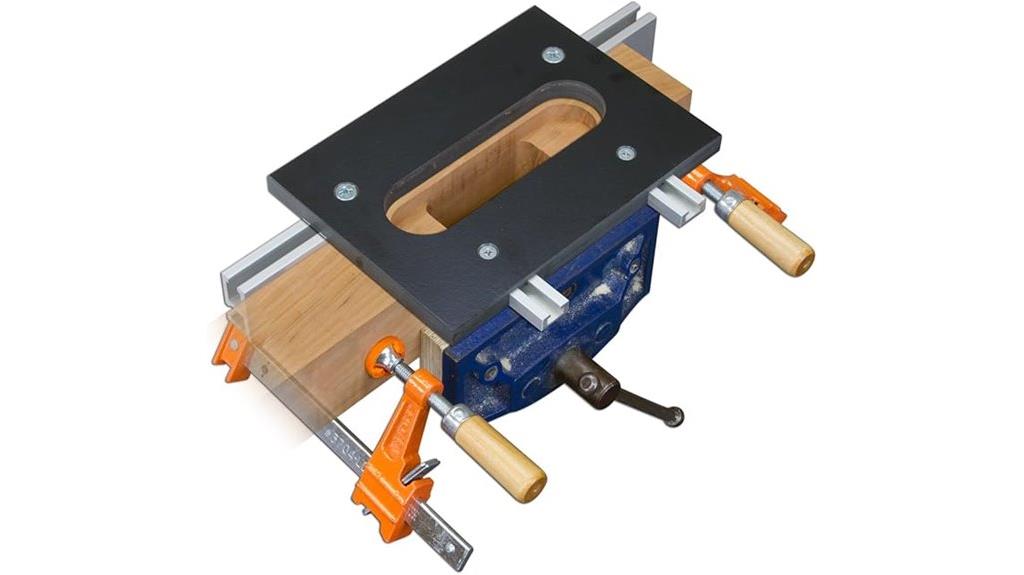
The 8668 Jig for SOSS 218 Invisible Hinge Mortise Installation stands out as an essential tool for woodworkers aiming for precise, professional hinge placements. It clamps securely to your workpiece without nail holes, allowing accurate cuts with a plunge router. Designed specifically for SOSS 218 hinges, it handles both shallow and deep mortises without repositioning. The jig includes two retractable stops for added accuracy and features a built-in hinge setback aligned with manufacturer specs. Compatible with a 1/2″ solid carbide upcut spiral bit and a 3/4″ bushing, it’s made in the USA and backed by a lifetime guarantee, ensuring reliable, high-quality results.
Best For: woodworkers and carpenters seeking precise, professional installation of SOSS 218 invisible hinges on various projects.
Pros:
- Clamps securely without nail holes, ensuring a stable setup during cutting.
- Handles both shallow and deep mortises without repositioning, saving time and effort.
- Made in the USA with a lifetime guarantee, reflecting high quality and durability.
Cons:
- Requires a specific 1/2″ solid carbide upcut spiral bit and 3/4″ bushing, which may need to be purchased separately.
- Compatibility limited to hinges with nose lengths not exceeding 3/8″ if using your own bushing.
- May have a learning curve for first-time users unfamiliar with plunge routers or hinge mortising.
CMT 543.190.51 Mortise Chisel & Bit Set, 3/4-Inch Diameter, 3/4-Inch Shank

The CMT 543.190.51 Mortise Chisel & Bit Set is ideal for woodworkers seeking precise mortising in hardwoods like white oak. Made from heavy-duty alloy steel, it features a 3/4-inch diameter bit and shank, designed for use with drill press mortising attachments. While it supports accurate joint creation, some users report rough machining, requiring sharpening or polishing before use. Performance varies, with some praising its chip ejection and sharpness, and others noting manufacturing defects like uneven augers or poor fit. Despite mixed reviews, it remains a versatile option for those willing to tune the tool for *best* results.
Best For: hobbyist and professional woodworkers seeking an affordable mortise chisel and bit set for precise joints in hardwoods like white oak, willing to perform tuning and sharpening as needed.
Pros:
- Constructed from heavy-duty alloy steel for durability and strength
- Compatible with standard drill press mortising attachments for accurate mortise creation
- Suitable for creating strong, reliable mortise and tenon joints in various hardwoods
Cons:
- Some units arrive with rough machining, requiring polishing and sharpening before use
- Reports of manufacturing defects such as uneven augers and poor fit in chucks
- Quality control appears inconsistent, with potential for defective or poorly finished tools
Tongue and Groove Router Bit Set of 2 Pieces
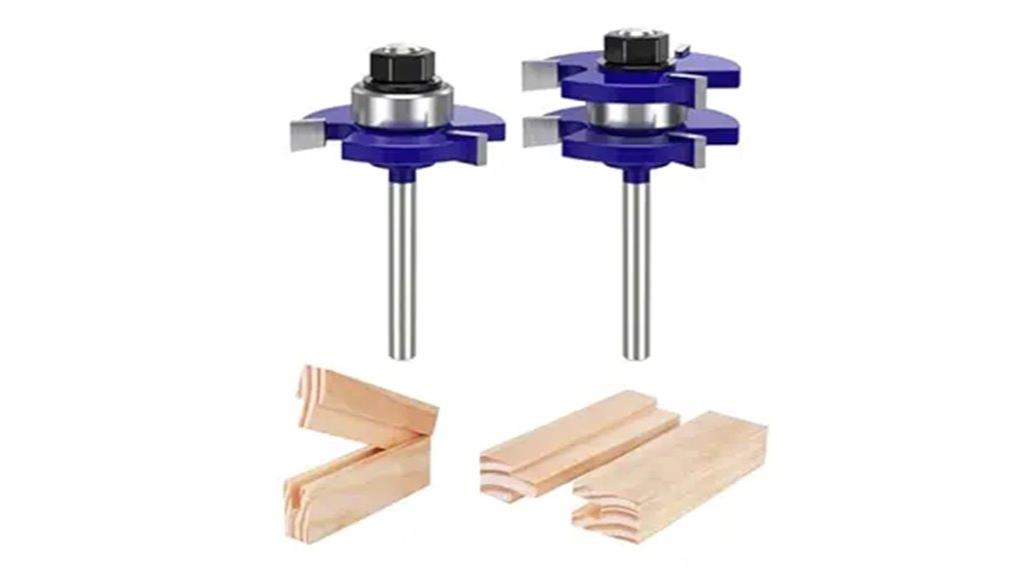
A Tongue and Groove Router Bit Set of 2 Pieces offers an excellent solution for DIY enthusiasts and hobbyists seeking precise joinery without investing in expensive professional tools. Made with durable alloy blades and solid hardened steel bodies, these bits are built for heavy-duty use. They feature an anti-kickback design for safe operation and produce smooth, clean cuts ideal for creating tight tongue and groove joints. Compatible with various woods, MDF, and plywood, they’re perfect for furniture, flooring, and DIY projects. Stored in sturdy boxes with individual containers, they combine value, performance, and convenience, making them a reliable choice for high-quality craftsmanship.
Best For: DIY enthusiasts, hobbyists, and woodworkers seeking affordable, reliable tools for precise tongue and groove joints in various woodworking projects.
Pros:
- Durable alloy blades and solid steel bodies ensure long-lasting performance.
- Produces smooth, clean cuts with minimal tear-out, ideal for high-quality joints.
- Comes with sturdy storage boxes and individual protective containers for convenience and protection.
Cons:
- Some users report minor discrepancies in groove and tongue sizes requiring careful setup.
- The storage boxes may feel flimsy; alternative storage might be preferred.
- Not suitable for non-wood materials like metals or steel, limiting versatility.
INTBUYING Woodworking Drilling Tenon Joint Mortise Tool Chisel Bit
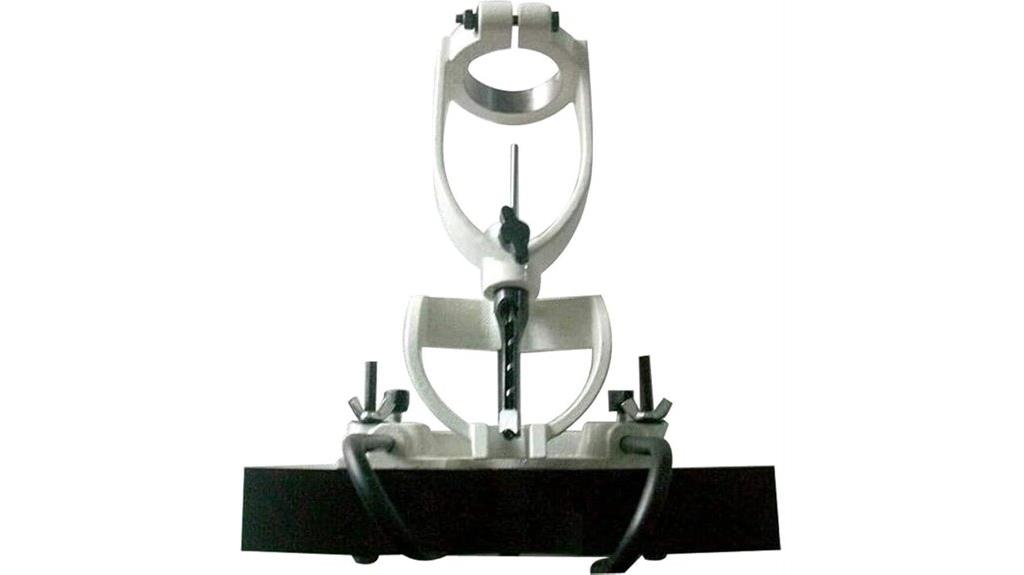
If you’re passionate about precise woodworking joints, the INTBUYING Woodworking Drilling Tenon Joint Mortise Tool is a reliable choice for creating clean, accurate mortises. This steel tool is designed for mortising and chiseling applications, compatible with specific bench drills. It features a straight flute design and a square shank, ensuring stability during use. Remember, it doesn’t include the drill or square bit, so you’ll need compatible equipment. Its compact size (about 45×35×20cm) makes it easy to handle. Perfect for woodwork projects requiring tight-fitting mortises, it’s a dependable addition for anyone aiming for craftsmanship and strength in their joints.
Best For: woodworking enthusiasts and professionals seeking precise mortising tools for creating accurate and clean joints.
Pros:
- Durable steel construction ensures long-lasting performance.
- Compatible with specific bench drills for stable and accurate operation.
- Compact size and straight flute design facilitate ease of handling and precision.
Cons:
- Does not include the bench drill or square drill bit, requiring additional equipment.
- Compatibility depends on matching specific drill sizes and clamp diameters.
- Suitable mainly for woodworking projects; not ideal for other materials or applications.
120 Degree Mortise and Tenon Router Bits Set for Woodworking
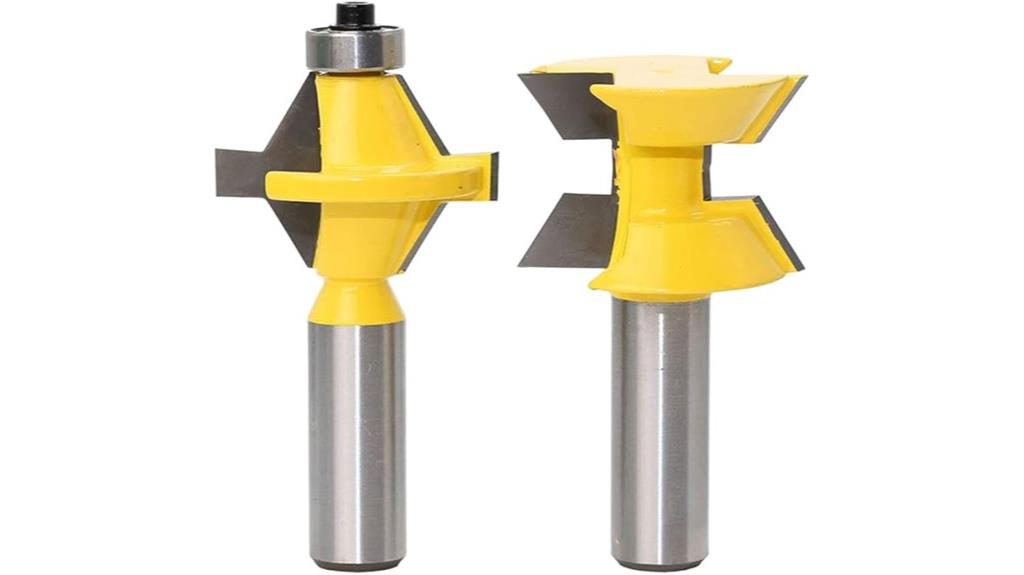
Looking for precise miter joints in your woodworking projects? The 120 Degree Mortise and Tenon Router Bits Set is perfect for creating strong, accurate joints. With a 1/2 shank diameter, these bits are compatible with routers and milling machines, suitable for solid wood, plywood, and particle board. Designed for woodworking, they deliver smooth, precise cuts while resisting wear and deformation thanks to high-quality alloy construction. Whether you’re working on door frames, cabinets, or boxes, these bits ensure consistent, tight fitting joints. Their high toughness and durability make them a reliable choice for professional and hobbyist woodworkers alike.
Best For: professional and hobbyist woodworkers seeking precise, durable joints in projects like door frames, cabinets, and boxes.
Pros:
- High hardness and toughness for long-lasting performance
- Accurate positioning and smooth, clean cuts
- Compatible with routers and milling machines with 1/2 shank
Cons:
- May require careful handling due to sharp cutting edges
- Not suitable for very soft or delicate materials
- Limited to applications involving miter and finger joints at 120 degrees
Factors to Consider When Choosing Mortise and Tenon Joints
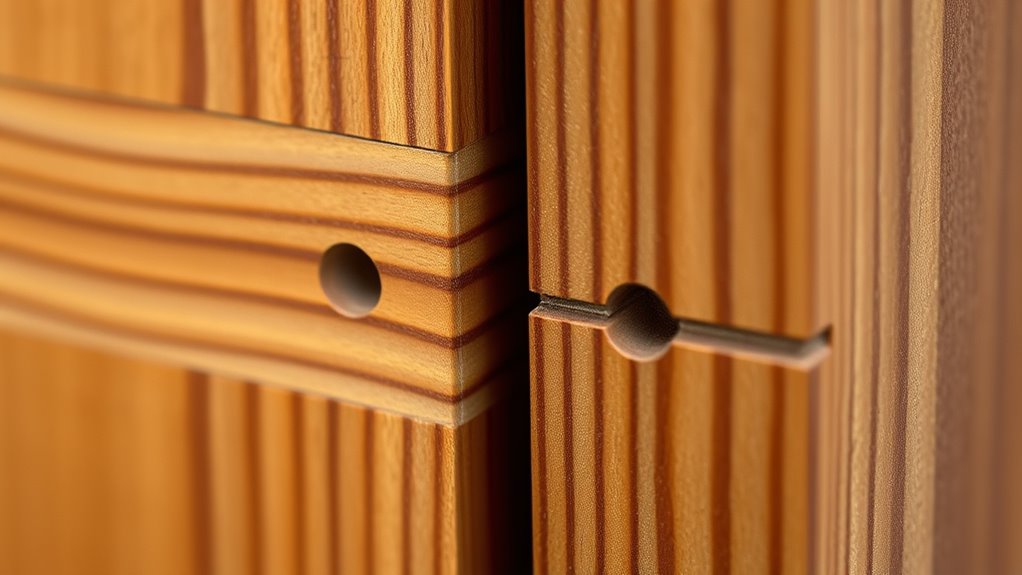
When selecting the right mortise and tenon joint, I always consider material compatibility and strength to make certain the joint can handle the load. I also focus on the fit and precision to guarantee a secure connection that’s easy to assemble. Ultimately, I evaluate tool compatibility, durability, and longevity to choose a joint that performs well over time.
Material Compatibility and Strength
Choosing the right materials for mortise and tenon joints is essential to guarantee strength and durability. It’s imperative to ensure compatibility between the wood types to prevent issues like splitting or weakening, especially when combining hardwoods and softwoods. Selecting appropriate wood species and achieving a snug fit with good glue adhesion helps maximize joint longevity. For high-stress applications, choosing materials and joint designs with superior shear and tensile strength is critical. Keep in mind that different woods have varying moisture contents, which can impact joint stability and the effectiveness of glue bonds over time. Additionally, using proper mortising tools and techniques to create precise, clean cuts maintains the material integrity of the joint, ensuring it remains strong and reliable for years to come.
Joint Fit and Precision
Achieving a precise fit between the mortise and tenon is vital for a strong, durable joint. It requires careful measurement and accurate cutting to guarantee the joint is snug but not tight. Variations in width, length, or depth can weaken the connection or affect its appearance. Using specialized jigs and templates helps maintain consistent dimensions, making multiple joints more reliable. Proper sharpening and maintenance of chisels and bits are essential for clean, precise cuts that improve fit. Before final assembly, testing the fit on scrap wood allows me to make adjustments, avoiding gaps or overly tight spots. By focusing on accuracy and consistency, I ensure each joint will perform well and contribute to the overall strength and craftsmanship of the piece.
Ease of Assembly
The ease of assembling mortise and tenon joints largely depends on how accurately and consistently the joints are cut. High-quality jigs and tools play a vital role, guaranteeing precise cuts that fit together smoothly. Proper alignment and repeatability reduce the need for extensive adjustments, saving time and effort during assembly. Features like adjustable guides, stops, and templates help streamline the process, making fitting easier and more efficient. Clear markings and secure clamping on jigs further guarantee consistent joint dimensions, which simplifies assembly. Additionally, compatibility with standard fasteners or adhesives can make final assembly straightforward. When these factors are in place, I find that mortise and tenon joints come together with less frustration and more confidence, resulting in a cleaner, more professional finish.
Tool Compatibility and Setup
Ensuring your mortise and tenon jig or tool is compatible with your router or drill press is essential for smooth operation. Check the size specifications and mounting requirements to confirm compatibility. Make sure the tool’s maximum capacity can handle your workpiece’s thickness and width to prevent limitations during cutting. Verify that setup features like adjustable fences, stops, or guides allow precise positioning and repeatability, which is vital for consistent joints. Consider whether the tool includes or supports accessories such as bushings, guide plates, or clamps that help with alignment and stability. Ultimately, assess if the design allows for easy adjustments and secure fastening to minimize movement or misalignment during use. Proper compatibility and setup streamline your workflow and improve joint accuracy.
Durability and Longevity
Choosing durable mortise and tenon joints depends heavily on the materials you select and how well you assemble them. Using high-quality hardwoods like oak or beech ensures a strong foundation that resists wear over time. Proper adhesive application and precise fitting are vital; a tight, well-glued joint prevents loosening or failure, even under stress. The accuracy of the cut and the fit minimizes stress concentrations, boosting resistance to environmental changes and daily use. Reinforced techniques, such as adding dowels or reinforcement plates, can greatly extend the joint’s lifespan, especially in high-stress applications. Regular maintenance, including checking for looseness and avoiding excessive moisture or load, helps preserve the joint’s integrity. When these factors are considered, your mortise and tenon joints will stand the test of time.
Cost and Value
When selecting mortise and tenon joints, balancing cost and value is essential to getting the best results for your project. Tool prices vary widely—from budget-friendly options around $20 to high-end systems over $1,000—so your choice impacts your overall budget. Investing in quality jigs or bits might cost more upfront but can improve precision and durability, saving money by reducing rework. Cheaper tools often lack accuracy and stability, leading to imperfect joints and more material waste, which diminishes value. It’s important to contemplate the price-to-performance ratio; affordable tools that consistently produce high-quality joints offer excellent value, especially for DIYers. Also, don’t forget to factor in potential costs for replacements, accessories, or upgrades over time.
Frequently Asked Questions
What Are the Differences Between Mortise and Tenon Joints and Other Woodworking Joints?
You’re asking about the differences between mortise and tenon joints and other woodworking joints. I find that mortise and tenon joints are unique because they fit together tightly, providing exceptional strength and stability, especially for furniture frames. Unlike simple butt joints or dowels, these joints are crafted for durability and craftsmanship. They require more skill but result in a sturdy, long-lasting connection that’s hard to beat in quality and resilience.
How Can I Ensure Precise Alignment When Fitting Mortise and Tenon Joints?
When I focus on ensuring precise alignment, I start by carefully marking and measuring my mortise and tenon. Coincidentally, I double-check my measurements before cutting, which helps prevent errors. I use sharp chisels and proper clamps to hold pieces securely, ensuring everything stays aligned during assembly. Taking my time and verifying fit at each step guarantees the joint fits perfectly, giving me confidence in both strength and craftsmanship.
What Materials Are Best Suited for Durable Mortise and Tenon Joints?
When choosing materials for durable mortise and tenon joints, I prefer hardwoods like oak, cherry, or maple because they’re strong and resist wear over time. Softwoods tend to be less durable, which can compromise joint integrity. I also look for well-seasoned wood to prevent warping or cracking. Using quality materials guarantees my joints stay sturdy and last for years, making my craftsmanship both reliable and beautiful.
How Long Does It Typically Take to Master Creating Strong Mortise and Tenon Joints?
Mastering strong mortise and tenon joints usually takes me several months of consistent practice. It depends on my experience with woodworking and the complexity of the joints I aim to create. I recommend starting with simple joints and gradually progressing. Patience and attention to detail are key. With dedication, I find I can develop solid skills within a few months, but perfecting craftsmanship takes ongoing practice.
Are Specialized Tools Necessary for Novice Woodworkers to Make Quality Joints?
You’re wondering if specialized tools are necessary for a novice to make quality mortise and tenon joints. I believe they’re helpful but not essential. Basic tools like a chisel, saw, and drill can do the job if you take your time and focus on precision. As you gain experience, you might invest in specialized tools, but starting with simple ones helps build your skills and confidence.
Conclusion
Did you know that mortise and tenon joints have been used for thousands of years, with some dating back over 2,000 years? Choosing the right jig or tool can make a huge difference in your craftsmanship and strength. Whether you’re building furniture or cabinets, mastering these joints elevates your work. I hope this guide helps you find the perfect tools to create sturdy, beautiful pieces that stand the test of time.

